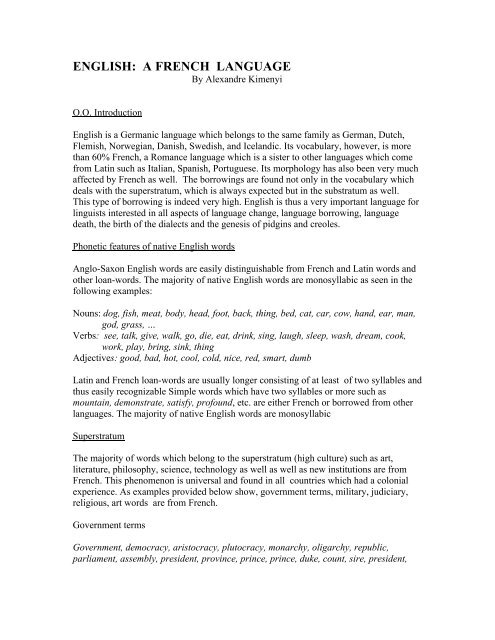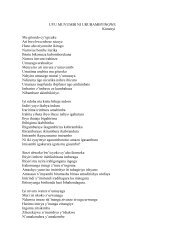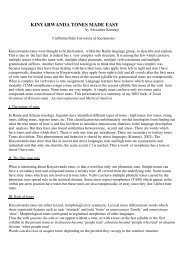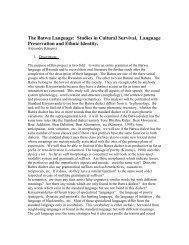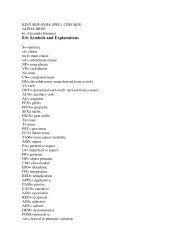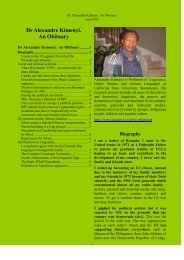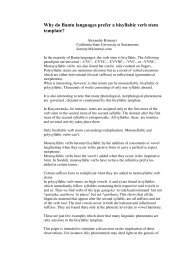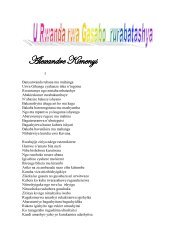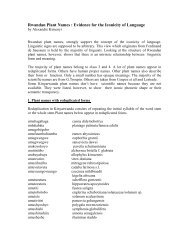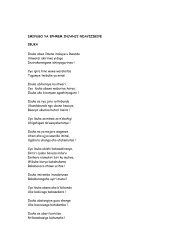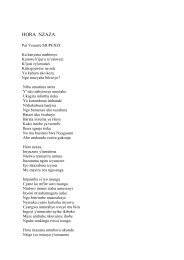ENGLISH: A FRENCH LANGUAGE - Alexandre Kimenyi
ENGLISH: A FRENCH LANGUAGE - Alexandre Kimenyi
ENGLISH: A FRENCH LANGUAGE - Alexandre Kimenyi
You also want an ePaper? Increase the reach of your titles
YUMPU automatically turns print PDFs into web optimized ePapers that Google loves.
<strong>ENGLISH</strong>: A <strong>FRENCH</strong> <strong>LANGUAGE</strong><br />
By <strong>Alexandre</strong> <strong>Kimenyi</strong><br />
O.O. Introduction<br />
English is a Germanic language which belongs to the same family as German, Dutch,<br />
Flemish, Norwegian, Danish, Swedish, and Icelandic. Its vocabulary, however, is more<br />
than 60% French, a Romance language which is a sister to other languages which come<br />
from Latin such as Italian, Spanish, Portuguese. Its morphology has also been very much<br />
affected by French as well. The borrowings are found not only in the vocabulary which<br />
deals with the superstratum, which is always expected but in the substratum as well.<br />
This type of borrowing is indeed very high. English is thus a very important language for<br />
linguists interested in all aspects of language change, language borrowing, language<br />
death, the birth of the dialects and the genesis of pidgins and creoles.<br />
Phonetic features of native English words<br />
Anglo-Saxon English words are easily distinguishable from French and Latin words and<br />
other loan-words. The majority of native English words are monosyllabic as seen in the<br />
following examples:<br />
Nouns: dog, fish, meat, body, head, foot, back, thing, bed, cat, car, cow, hand, ear, man,<br />
god, grass, …<br />
Verbs: see, talk, give, walk, go, die, eat, drink, sing, laugh, sleep, wash, dream, cook,<br />
work, play, bring, sink, thing<br />
Adjectives: good, bad, hot, cool, cold, nice, red, smart, dumb<br />
Latin and French loan-words are usually longer consisting of at least of two syllables and<br />
thus easily recognizable Simple words which have two syllables or more such as<br />
mountain, demonstrate, satisfy, profound, etc. are either French or borrowed from other<br />
languages. The majority of native English words are monosyllabic<br />
Superstratum<br />
The majority of words which belong to the superstratum (high culture) such as art,<br />
literature, philosophy, science, technology as well as well as new institutions are from<br />
French. This phenomenon is universal and found in all countries which had a colonial<br />
experience. As examples provided below show, government terms, military, judiciary,<br />
religious, art words are from French.<br />
Government terms<br />
Government, democracy, aristocracy, plutocracy, monarchy, oligarchy, republic,<br />
parliament, assembly, president, province, prince, prince, duke, count, sire, president,
minister, senator, deputy, governor, vote, dictator, tyrant, Détente, rapprochement,<br />
interregnum, congress, ambassador, chargé d’affaires<br />
Military terms<br />
Military, arms, strategy, brigade, brigadier, platoon, arsenal, ambush, soldier, corporal,<br />
marshal, general, colonel, captain, major, lieutenant, sergeant, cadet, assault, canon,<br />
pistol, casualty, squadron, helicopter,<br />
Religion terms<br />
Religion, altar, sacrosanct, pope, cardinal, priest, friar, Eucharist, saint, angel, baptize,<br />
pagan, crucifix, redemption, communion, prophet, disciple, temple, sacrifice, choir,<br />
chapel, sanctuary, pontificate, demon, friar, deacon, Satan, apostle, laity (laicité), choir<br />
(chorale), messiah, testament, seminary, rectory, ecumenical, monsignor, cathedral,<br />
schism, excommunicate,<br />
Dance terms<br />
Allongé, arabesque, assemble, balancé, balancoire, ballet, ballloné, balloté, battement,<br />
battu, bourre, chasse, combre, chaines, coupe, dégagé, détourné, developpe, effacé,<br />
emboité, enveloppé, en croix, en dedans, en dehors, fouetté, frappé, glissade, grand<br />
battement, jambe, jeté, pas de deux, pas de trois, pas de cheval, pas de chat, port de<br />
corps, port de bras, pas de bourrée, penché, pied, positions, quatre, retiré, relevé, rond<br />
de jambe, royal, saute, serre, sissone, sous-sus, soutenu, tendu, temps lié, tombé, trio,<br />
tour<br />
Musical instruments:<br />
piano, guitar, trumpet, violin, accordion,<br />
The reason why the superstratum is dominated by the colonial language is first due to the<br />
fact that the conquering power always destroys the native institutions and replaces them<br />
with its own. The colonial language becomes the official language and the native elite<br />
which the conquering power needs to achieve its colonial goals assimilates to the<br />
conquerors’ new culture. This borrowing in the superstratum continued with the<br />
Renaissance, the Enlightenment movement , the Industrial Revolution and the modern<br />
science, trade and technology in which mutual borrowings started occurring until today.<br />
Substratum (Low Culture)<br />
Usually when a country is conquered and colonized, words which refer to ‘lower culture’<br />
are not affected. It is usually the new indigenous elite which works with the colonial<br />
power which assimilates.
The masses keep using their language. Thus words which refer to universal natural<br />
phenomena and events such as to die , human activities such as to eat, to drink, to sleep,<br />
to die, to work, to walk, to talk, to ask, marry etc. are usually not borrowed. There is no<br />
need to borrow words which refer to body parts, fauna and flora, landscape, … because<br />
all languages have words which refer to them. English, however, has borrowed<br />
extensively from French a lot words related to these concepts, as we can see.<br />
Body parts<br />
Arm, palm, stomach, intestines, vagina, clitoris, penis, testicles, abdomen, artery, vein,<br />
ligament, spine, larynx, vocal cords<br />
Kinship Terms<br />
Family, parents, grandparents, uncle, aunt, nephew, niece, cousin, marriage, divorce,<br />
orphan.<br />
Words for animals<br />
Animal, insect, beast, monster, ogre, insect, elephant, lion, hyena, leopard, antelope,<br />
zebra, gazelle, buffalo, giraffe, tiger, panther, hippopotamus, crocodile, reptile, viper,<br />
cobra, boa, dolphin, anchovies, oyster, salmon, falcon, eagle, egret, vulture, pigeon,<br />
rat, serpent, lizard, larva, insect, squirrel, panther, crab, porcupine, cattle (cheptel),<br />
gorilla, chimpanzee, orangutan, caiman, partridge, kangaroo, flamingo, dinosaur,<br />
dragon<br />
Landscape<br />
Mountain, plateau, valley, plain, ocean, river, lake, jungle, forest, canyon, ravine,<br />
volcano, village, savannah, corner, terrain, planet, globe, galaxy, stratosphere, sphere,<br />
firmament, archipelago (archipel), bay, peninsula, glacier, meander, ravine, summit,<br />
estuary, prairie<br />
Time expressions:<br />
Hour, minute, second, day, decade, century, moment, season, autumn, semester,<br />
trimester, decade, century, January, February, March, April, May, June, July, August,<br />
September, October, November, December,<br />
Diseases<br />
fever, malaria, tuberculosis, pneumonia, cancer, bronchitis, hemorrhage, gonorrhea,<br />
leprosy, syphilis, rheumatism, symptom, asthma, diabetes, paralysis, polio,<br />
Diarrhea, elephantiasis, dementia, delirium, hysteria,<br />
Professions:
Tailor, gardener, farmer, sculptor, carpenter, merchant, mason, butcher, falconer,<br />
buccaneer, trapper,<br />
Numbers: six, dozen, cent, million<br />
Food<br />
Cuisine, dinner, beef, mutton, veal, appétit, menu, soup, sauce, entrée, lettuce, salad,<br />
dessert, juice, pork, ingredients, recipe, spices, dinner, supper, appetizers, lettuce,<br />
sausage, entrée, foie gras, hors-d’oeuvre,<br />
Adjectives:<br />
Adjective, large, vast, grand, long, spacious, stupid, intelligent, innocent, dangerous,<br />
rapid, bizarre, unique, curious, complete, severe, important, certain, sure, sincere,<br />
generous, difficult, calm, quiet, simple, opaque, vague, blue, brown, beige, ignoble, gray<br />
Usually for the colonial language to penetrate the substratum there has to be a total<br />
assimilation of the conquered population . This is usually impossible unless the<br />
indigenous people are exterminated in genocide as what happened in the Americas where<br />
Mestizos speak either Spanish, Portuguese, or English or Australia and New Zealand<br />
where the Aborigines started to speak English because of genocide and ethnocide.<br />
For English to become a Latin-French language also, a similar situation might have<br />
occurred.<br />
From 43 AD to late 90 AD, England was part of the Roman Empire. From the 11 th<br />
Century to the 14 th Century, it was a Norman territory. Both invasions had a very heavy<br />
impact the English language and culture. But it was mostly the Norman Conquest which<br />
had the greatest impact on the English language. When William the Conqueror of<br />
Normandy conquered England in 1066, he destroyed all existing Anglo-Saxon<br />
institutions, namely the educational system, the religious system, the military system, the<br />
economic system, the judicial system, the legal system, etc. and replaced them with<br />
Norman system just like in other colonial cases. Not only French became the<br />
administrative, educational and trade language but also the language of the high class.<br />
But for it to become the language of the masses, it implies that thousands of Normans<br />
poured into England and became settlers. There are indeed two types of colonialism: long<br />
distance colonialism (absentee landlords) and settlers. Long distance colonialism like the<br />
one practiced by Europeans in Africa and Asia by Europeans during the 20 th Century<br />
only affected the superstratum but the one practiced in the Americas, in Australia and<br />
New Zealand where colonizers became settlers affected both the superstratum and the<br />
substratum.<br />
I. Formal Properties of French loan-words
Recent French loan-word are easily recognizable because they still have French language<br />
features such as accents, feminine gender markers, spelling, etc …<br />
Amateur, agent provocateur, chauffeur, restaurateur, touché, émigré, habitué, fiancé(e),<br />
blaze, expose, naïvete , grandeur, masseuse, camaraderie, repertoire, reverie,<br />
doctrinaire, financier, tableau, décor, en masse, en route, routine, finesse, machine,<br />
expose.<br />
There are even English words which have both the masculine form and the feminine form<br />
just like in French:<br />
masculine/feminine<br />
heroheroine<br />
princeprincess<br />
dukeduchess<br />
baronbaroness<br />
deandoyenne<br />
blondblonde<br />
petitpetite<br />
grandgrande<br />
English also has full noun phrase and verb phrase French and Latin expressions such as:<br />
enfant terrible<br />
cause célèbre<br />
ménage à trois<br />
femmes fatales<br />
eminence grise<br />
nouveau riche<br />
faux pas<br />
patron saint<br />
nom de guerre<br />
haute cuisine<br />
haute couture<br />
bon mot<br />
idées fixes<br />
adieu<br />
bon vivant<br />
vox populi<br />
sui generis<br />
alter ego<br />
ipso facto
mutatis mutandis<br />
non sequitur<br />
ad hominem<br />
annus horribilis<br />
inter alia<br />
vice versa<br />
Some loan-words, however, are not recognizable because they are archaic French words<br />
which have disappeared from its vocabulary or because of the opacity due to orthography<br />
or different suffix or prefix addition.<br />
1.1. Archaic French words:<br />
DismayOF dimaieyer OF<br />
SeveralL separalis<br />
EagerOF eager<br />
SealOF seel<br />
VeryOF verai<br />
Suit OF seoir<br />
ObviousL obvius<br />
PreviousL praevius<br />
Pledge L plevium<br />
ScheduleMF sedule<br />
FeatureMF faiture<br />
GenuineL genuinius<br />
The loan-word opacity from French is due also to spelling, addition or deletion of affixes<br />
as some examples show below:<br />
Pursuepoursuite<br />
Damageendommager<br />
Pressurepression<br />
Heirhéritier<br />
slavery exclavage<br />
surgerychirurgie<br />
inhabitanthabitant<br />
obituaryobsèques<br />
closureclôture<br />
trucetrève<br />
insureassurer<br />
habithabitude<br />
cellcellure<br />
denynier<br />
mosquitomoustique<br />
eventévenement
consentconsentement<br />
scissorsciseaux<br />
1. 2. Franglais (FrenchEnglish)<br />
Although, English has heavily borrowed from French, a reverse phenomena is taking<br />
place today. Because of the global influence of the US in international trade, technology,<br />
and popular culture, French has a lot of American English loan-words in what is known<br />
in French as Franglais (French English).<br />
Here are some examples.<br />
Leadership, la challenge, meeting, weekend, le sandwich, le streaptease, le snackbar, le<br />
melting pot, le parking, le steak, gentleman, leader, leadership, drugstore, lasso, insight,<br />
gangster, cocktail, ketchup, jogging, jean(jeans), T-shirt, smoking (dining jacket), blog,<br />
cowboy, hooligan, horse power, hot dog, smicard, smocks, smurf, slip, smash, smart,<br />
sketch, software, snack-bar, scanner, slow, bulldozer.<br />
1. 3. Sound Correspondence:<br />
The term Sound correspondence is used in comparative and historical linguistics, to refer<br />
to a systematic sound differentiation between two languages due to sound change. For<br />
instance, the initial Indo-European sound p changed to f in some Indo-European<br />
languages as we see in the examples below in which French kept the p sound whereas<br />
that of English changed to f.<br />
Pf<br />
Fartpêter<br />
Fewpeu<br />
Forpour<br />
Footpied<br />
Fatherpère<br />
Fishpoisson<br />
There are thousands of French loan-words in English which , compared to Modern<br />
French, exhibit this systematic sound difference. For instance, some words with the<br />
sound w have g in its position.<br />
Wg<br />
Warguerre<br />
WalesGales
WilliamsGuillaume<br />
Waspguêpe<br />
Wagegage<br />
Wafflegauffre<br />
Wardenguardien<br />
Warrantygarantie<br />
Wardrobegarde-robe<br />
Warrengarenne<br />
Some words with the cluster st in English have a circumflex accent in the s position.<br />
sC’C<br />
beastbête<br />
feastfête<br />
mastermaître<br />
screenécran<br />
priestprêtre<br />
costcoût<br />
hosthôte<br />
coastcôte<br />
costcouter<br />
hastehâte<br />
forestforêt<br />
disgustdégout<br />
pastepâte<br />
honesthonnête<br />
questquête<br />
In some the sound k written a c is pronounced sh written as ch<br />
castlechâteau<br />
escapeéchapper<br />
scarpelécharpe<br />
scaleéchelle<br />
marketmarche<br />
capchapeau<br />
catchat<br />
al/el/Ctleau<br />
castlechâteau<br />
mantlemanteau<br />
salmonsaumon
camelchameau<br />
vesselvaisseau<br />
psalmpsaume<br />
altarautel<br />
almoneraumonier<br />
alsoaussi<br />
balmbaume<br />
falconfaucon<br />
palmpaume<br />
panelpanneau<br />
salvagesauver<br />
vealveau<br />
yO<br />
paganpaien<br />
plagueplaie<br />
deandoyen<br />
meansmoyens<br />
mastermagister (pedantic)<br />
oou<br />
mountainmontagne<br />
roundrond<br />
soundson<br />
countcompter<br />
profoundprofond<br />
recountraconter<br />
announceannoncer<br />
eie<br />
mattermatière<br />
mannermanière<br />
cemeterycimetière<br />
careercarrière<br />
sorcersorcière<br />
riverrivière<br />
feverfièvre<br />
paperpapier<br />
ishir<br />
punishpunir<br />
finishfinir
polishpolir<br />
establishétablir<br />
accomplishaccomplir<br />
nourishnourir<br />
abolishabolir<br />
demolishdémolir<br />
tarnishtarnir<br />
Parasitic n insertion<br />
messengermessager<br />
passengerpassager<br />
ostrenger<br />
harbinger<br />
scavenger<br />
wharfinger<br />
pv<br />
pepperpoivre<br />
coppercuivre<br />
pauperpauvre<br />
The ish and ir sound correspondence (finishfinir, perishperir) is due to rhoticism, a<br />
universal phonetic rule which changes the liquid r into another consonant or vice versa.<br />
The English Great Vowel Shift which occurred in Middle English (1200-1800) created<br />
front vowels, long vowels and diphthongs. It is in this period also that occurred the<br />
deletion of the unstressed mid-vowel front final vowel e. The Great Vowel Shift and the<br />
deletion of the final vowel were also responsible for the genesis of umlaut: vowel<br />
fronting and regressive vowel harmony.<br />
1. 4. French Morphemes<br />
Not only has English borrowed words but morphemes as well. Some of these morphemes<br />
such as the suffixes: -an, -or, -ent, -ist, -ant, -ate, -ify, -ity, are not productive and are<br />
found with French or Latinate words only.<br />
Suffixes<br />
-an<br />
egalitarian<br />
humanitarian<br />
contrarian
doctrinarian<br />
-or<br />
actor<br />
director<br />
inspector<br />
sculptor<br />
doctor<br />
contractor<br />
-ent<br />
president<br />
resident<br />
efficient<br />
student<br />
-ist<br />
specialist<br />
dentist<br />
anthropologist<br />
chemist<br />
linguist<br />
journalist<br />
capitalist<br />
-ant<br />
dormant<br />
repentant<br />
dominant<br />
protestant<br />
radiant<br />
-ate<br />
private<br />
intimate<br />
innate<br />
illiterate
-eur<br />
chauffeuring<br />
raconteuring<br />
-ify<br />
glorify<br />
simplify<br />
quantify<br />
justify<br />
codify<br />
gratify<br />
signify<br />
-ity<br />
unity<br />
stupidity<br />
futility<br />
bestiality<br />
mortality<br />
brutality<br />
utility<br />
ability<br />
nationality<br />
durability<br />
Some French suffixes, however, such as: -age, -able, -ize, etc. are very productive and<br />
apply to native English words as well.<br />
-age<br />
bondage<br />
linkage<br />
sewage<br />
rampage<br />
blockage<br />
wreckage<br />
-able<br />
likable<br />
lovable<br />
livable
workable<br />
sellable<br />
reliable<br />
drinkable<br />
eatable<br />
unbearable<br />
-ize<br />
weatherize<br />
weaponize<br />
Prefixes<br />
The majority of prefixes found in English words happen to be French or Latin also.<br />
Pre-: prefix, predetermination, preposition, predict<br />
Re-: redistribute, relocation, recreation, redemption<br />
Dis-: discover, disclose, dismantle, disrespect, disenfranchise<br />
Anti: antiestablishment, anti<br />
Ante: antecedent, antebellum,<br />
Infra-: infrastructure, inframarginal, infrasonic, infrared, infracostal<br />
Counter-: counterproductive, counterintuitive, counterculture<br />
Retro-: retrospect, retroactive,<br />
Pro-: proactive, proconsul, prochoice,<br />
Trans-: transaction, transport, transmit, transcend, transform<br />
Con-: combat, compete, converse, concurrence, concord<br />
In-: impossible, incompetent, incorrect, indecent<br />
Circum-: circumscribe, circumstance, circumnavigate, circumvent, circumrotate<br />
Ex-: exterminate, expulse, extirpate, expose<br />
Inter-: international, intercontinental, intercourse, intersection<br />
II. Impact of French and Latin loan-words on English<br />
Not only has borrowing from French enriched the English language in increasing the<br />
vocabulary creating synonyms , and synonyms with subtle meanings but it also created<br />
doublets, false cognates and calques.<br />
2.1. Synonymy:<br />
English has a lot of synonyms due to this borrowing from French. This has increased the<br />
vocabulary tremendously. Below are some examples.<br />
Rebirthrenaissance<br />
Floodinundation
Towncity<br />
Slaughterbutcher<br />
snakeserpent<br />
tonguelanguage<br />
coatvest<br />
catchcapture<br />
wondermiracle<br />
crazyfool<br />
Spearlance<br />
bowarc<br />
smartintelligent<br />
illnessmalady<br />
Helpaid<br />
Buildconstruct<br />
Climbmount<br />
Go downdescend<br />
reachattain<br />
It is also interesting to see that Latin words have been used to serve as adjectives of<br />
Anglo-Saxon words:<br />
Pedal(foot)<br />
Corporal (body)<br />
Cardiac (heart)<br />
Royal (king)kingly<br />
Regal (king)<br />
Celestial (sky)<br />
Terrestrial (earth)earthy<br />
Lunar (moon)<br />
Lunatic (moon)<br />
Stellar (star)<br />
Aquatic (water)<br />
Dental (tooth)<br />
Labial (lip)<br />
Pulmonary (lung)<br />
Lingual (tongue)<br />
Infernal (hell)hellish<br />
Manual (hand)<br />
Annual (year)yearly<br />
Nocturnal (night)<br />
Digital (finger)<br />
Divine (God)<br />
Canine (dog)<br />
Feline (cat)<br />
Paternal (father)brotherly<br />
Maternal (mother)
Male (man)manly<br />
Female (woman)<br />
2. 2. Latinate words with subtle meanings<br />
The borrowing has also enriched the semantics of the language. Although, French and<br />
Latin words seem to be synonymous, a genesis of subtle meanings has emerged as well as<br />
the formal and informal use of the words.<br />
Askdemand<br />
Answerrespond<br />
Understandcomprehend<br />
Sendenvoy<br />
Endfinish<br />
Writescribe<br />
Speakparlay<br />
Teachinstruct<br />
Driveconduct<br />
Leaddirect<br />
Helpaid<br />
Huntchase<br />
Feednurse<br />
Farmcultivate<br />
Lambmouton<br />
Chickenpoultry<br />
Sweatperspire<br />
shipvessel<br />
borderfrontier<br />
tripvoyage<br />
learnapprehend<br />
leavequit/abandon<br />
canebaton<br />
givedonate<br />
whispermurmur<br />
feednurture<br />
feelingssentiments<br />
Praiselaud<br />
Worshipadore<br />
Backendorse<br />
Embodyincorporate<br />
Worklabor<br />
Explainexplicate<br />
Fast/quickrapid<br />
Hitbatter<br />
Meetencounter (rencontrer)<br />
Raiseelevate
Freedomliberty<br />
2. 3. Doublets<br />
Doublets are words which have both near phonetic and semantic similarity due , either<br />
to linguistic change and semantic shift, to dialects or loan-words from mostly languages<br />
from the same language family. English has many doublets, as we see below.<br />
Cafécoffee<br />
priceprizeprix,<br />
Royalregal<br />
Memorymemoir<br />
Policypolitics<br />
Critiquecriticism<br />
Cartooncaricature<br />
Parakeetparrot<br />
Useusage<br />
Trooptroupe<br />
Hotelhostel<br />
Roadroute<br />
Chefchief<br />
Frailfragile<br />
Channelcanal<br />
Poorpauper<br />
Strangestranger<br />
Salonsaloon<br />
Premierprime minister<br />
Bombbombard<br />
Speciallyespecially<br />
Nourishnurture<br />
False.faux<br />
Appétitappetite<br />
Mélangemixture<br />
Premierpremiere<br />
Portraitportray<br />
Regimeregimen<br />
Blondblond<br />
Finalfinale<br />
Locallocale<br />
Chateaucastle<br />
Nounname<br />
Tempertemperature<br />
Salvagesave<br />
Proposalproposition<br />
Personpersona<br />
Entréeentrance
Rankrange<br />
Praypraise<br />
Lancelaunch<br />
Riteritual<br />
Populationpopulace<br />
Examplesample<br />
Unifyunite<br />
Moralmorale<br />
Humanhumane<br />
Experienceexperiment<br />
Liquorliqueur<br />
Dominatedomineer<br />
Governorgoverness<br />
Dominatedomineer<br />
Environsenvironment<br />
Mountmound<br />
Governorgoverness<br />
Commandercommandant<br />
Chairchaise<br />
Musicalmusicale<br />
Testimonytestimonial<br />
Scaleechelon<br />
Corpsecorps<br />
Toolstool<br />
Gentlegenteel<br />
Councilorcounselor<br />
Dominatedomineer<br />
Candlechandelier<br />
Praypraise<br />
Proposalproposition<br />
Namenominate<br />
Islandisle (île)<br />
Posepoise<br />
Giantgigantic<br />
Ventureadventure<br />
Lunarlunatic<br />
Exposeexposition<br />
Placeplaza<br />
Emergenceemergency<br />
2. 4. Faux Amis<br />
There are words which are found in two languages which are related or not related.<br />
This similarity can be accidental and this is a case of homonymy. There are those,<br />
however, because they are related as either as loan-words as in the case of English and<br />
French or because they are related. Thus many people confuse sale of English and sale of
French meaning ‘dirty’ as cognates when it is not the case. For words to qualify the label<br />
of true cognates or false cognates , they have to be related semantically. In the case of<br />
true cognates, there has to the an identity of meaning., a one-to-one relationship between<br />
the two lexical items in both languages.<br />
In the case of false cognates, there is a metonymic relationship between the referents of<br />
both words. That is, an association or factual contiguity, exists in those referents. This<br />
relation can be that of cause and effect (ex. a blind area), part and whole (ex.<br />
Washington sent a letter of protest to Moscow), content and container (ex. the White<br />
House invited the Kremlin) , product and origin (ex. they were smoking a Havana),<br />
product and producer (ex. he bought a Picasso), emblem and institution (ex. The crown<br />
of England)<br />
Lecturelecture (reading done outloud)<br />
Librarylibrairie (bookstore)<br />
Restrester (remain)<br />
Discoursediscours (speech)<br />
Engineengin (machine/appliance)<br />
Bribebribes (scrabs/crumps)<br />
Nursenourrice (wet nurse)<br />
Finefin (refined)<br />
Impeachempêcher (prevent)<br />
Collegecollège (high school)<br />
Easyaise (comfortable)<br />
Commencementcommencement (beginning)<br />
Managermenagere (housewife)<br />
Injuryinjure (offense)<br />
Chantchanter (sing)<br />
Designdessiner (draw)<br />
Editéditer (publish)<br />
Scholarécolier (pupil)<br />
Legumeslégumes (vegetables)<br />
Vegetablesvegetaux (plants)<br />
Drugdrogue (illicit substance)<br />
Noisenoise (chercher noise: to look for dispute/fight)<br />
Stage
Conductorconducteur (driver)<br />
Orchestraorchestre (musical band)<br />
Gradegrade (rank)<br />
Physician
purposepropos (subject/topic)<br />
phrasephrase (sentence)<br />
foyer foyer (home)<br />
agreeagréer (to please/suit)<br />
agreementagrément (charm/attractiveness)<br />
singlesingle (single disc/single room)<br />
agendaagenda (diary)<br />
resumerésumer (summarize)<br />
paroleparole (word)<br />
quartersquartier (neighborhood)<br />
trytrier (select)<br />
ttavailtravail (work/job)<br />
plateplat (dish)<br />
curatorcurateur (guardian/trustee)<br />
salutesaluer (greet)<br />
appointmentappointements (salary)<br />
pregnantpregnant (meaningful)<br />
ministerministre (government minister)<br />
chantchanter (sing)<br />
marchmarcher (walk)<br />
crycrier (shout)<br />
aisleaîle (wing)<br />
corpsecorps (body)<br />
patronpatron (customer)<br />
tableautableau (blackboard)<br />
retire se retirer (leave)<br />
resignse résigner (give up)<br />
charitycharité (love)<br />
summarysommaire (summary of a journal or book)<br />
exposeexposé (exhibition<br />
talontalon (heel)<br />
assuranceassurance (insurance<br />
fraudfraudeur (smuggler/cheater)<br />
hosthôte (guest)<br />
marinemarin (sailor)<br />
functionaryfonctionaire (civil servant)<br />
portmenteauportementeau (coat hanger)<br />
ballotballot (bundle/package)<br />
matinéematinée (in the morning)<br />
encoreencore (again)<br />
laborlabeur (hard word)<br />
laborlabour (tilling/ploughing)<br />
There are words which are also partial cognates. In one language, the cognate might be<br />
polysemous whereas in the other language, it may have only one referent.
Thus used whose cognate in French is usé has two meanings in English namely<br />
‘utilized’ and ‘accustomed’ but the French cognate usé has only one meaning, namely<br />
‘old’.<br />
In French casserole means ‘a cooking pot’ only, whereas in English it means a dish<br />
mostly but may also mean ‘cooking pot’ but used rarely.<br />
2. 5. French calques<br />
Not only has English borrowed French words , morphemes and expressions but has it<br />
also tried to make these expressions its own by translating them into English. This is, in<br />
linguistics, known as calques. These calques abound as we see in the examples provided<br />
below.<br />
To take the bull by the horns (prendre le taureau par les cornes), to build<br />
castles on sand (batir les chateaux sur le sable), the ball is in your court (la<br />
balle est dans votre camp), to put the cart before the ox (mettre la charrue<br />
devant le boeuf), to give the green light (donner le feu vert), rising star<br />
(etoile montante), a striking example (un exemple frappant), a doubleedged<br />
sword (une epee a double trenchant),diametrically opposed<br />
(diamétralement oppose), not to mince words (ne pas macher ses mots),<br />
cornerstone (pierre angulaire), with the naked eye (a l’oeil nu), common<br />
denominator (dénominateur commun), lion’s share (part du lion), to hand<br />
a blank check (donner un chèque en blanc), to kill two birds with one stone<br />
(une pierre, deux coups), to cast the first stone (jeter la premiere pierre), to<br />
rest upon one’s laurels (dormir sur ses lauriers), a burning question (une<br />
question brulante), to thank from the bottom of one’s heart (remercier du<br />
fond de son coeur), to have goose bumps (avoir la chair de poule), skirt<br />
chaser (coureur de jupon), to strike the iron while it’s hot (frapper le fer<br />
quand il est chaud), vicious circle (un cercle vicieux), read between the<br />
lines (lire entre les lignes), a ticking time bomb (une bombe a retardement),<br />
a matter of life and death (une question de vie ou de mort), spring up like<br />
mushrooms (pousser comme des champignons), a ray/glimmer of hope (un<br />
rayon d’espoir), paper tiger (tigre en papier), witch hunt (chasse aux<br />
sorcieres, brain drain (fuite de cerveau), from the bottom of the heart (du<br />
fond du Coeur), the cream of the cream (la crème de la crème), safety<br />
valves (les valves de sauvetage), to rule with an iron fist (diriger avec un<br />
bras de fer), to run the risk of (courir le risqué), a lone ranger (cavalier<br />
seul), to have a soft spot (avoir un point faible), evil incarnate (le diable<br />
incarne), the law of the jungle (la loi de la jungle), to swim against the<br />
current (nager a contre-courant), to shoot oneself in the foot (se tirer une<br />
balle dans le pied), a rallying cry (un cri de ralliement), to come emptyhanded<br />
(rentrer les mains vides), a lion’s share (la part du lion), to be<br />
diametrically opposed (être diamétralement oppose), goatie (barbuche de<br />
chèvre), pepper and salt hair (cheveux poivre et sel), to be armed to the<br />
teeth (être armé jusqu’aux dents), sticking points (points saillants),<br />
honeymoon (lune de miel), to settle the matter once and for all (résoudre la
question une fois pour toutes), être plus catholique que le pape (to be more<br />
catholic than the Pope), to cry wolf (crier au loup,) to be behind bars (être<br />
derrière les verrous), a thorny question (une question épineuse), to be on<br />
the same wavelength (être sur la même longueur d’onde), pell-mell (pêlemêle),<br />
to roll one’s sleeves (retrousser les manches), to read between the<br />
lines (lire entre les lignes), to have one’s feet on the ground (avoir les pieds<br />
sur terre), to get goosebumps (avoir la chair de poule ‘to have chicken’s<br />
flesh’), to get the last laugh (rira bien qui rira le dernier), if the mountain<br />
doesn’t go to Mohamed, Mohamed goes to the mountain (si la montagne ne<br />
va pas à Mohamed, Mohamed va à la montagne), lightening visit (une visite<br />
éclaire, crocodile tears (les larmes de crocodile), to get goose bumps<br />
(avoir la chair de poule), to munch one’s words (mâcher ses mots), it’s not<br />
the end of the world (ce n’est pas la fin du monde), a ghost town (une ville<br />
fantôme)., with the naked eye (à l’oeil nu), between the hammer and the<br />
anvil (entre le marteau et l’enclume), the cradle of civilization ( le berceau<br />
de civilization), to ring alarm bells ( tirer la sonnette d’alarme), free fall<br />
(chute libre), belt tightening (serrer la ceinture), inferiority/superiority<br />
complex, the ends justify the means (les fins justifient les moyens)., to roll<br />
up sleeves (retrousser les manches), to swim against the stream/current<br />
(nager contre le courrent), to draw the conclusion (tirer la conclusion),<br />
behind bars (derrière les verroux), cold blood (sang froid), minutely<br />
detailed (minutieusement détaillé, from the four corners of the world (des<br />
quatre coins du monde), to point the finger (pointer le doigt), visceral<br />
hatred (une haine viscérale), everybody knows that X wears the pants in<br />
the house (tout le monde sait que c’est X qui porte le pentalon à la<br />
maison), to draw attention (attirer l’attention), to draw a conclusion (tirer<br />
la conclusion), to put on a pedestal (mettre sur le pedestral), it is written<br />
black on white (c’est écrit noir sur blanc), an iron fist in a velvet glove (un<br />
bras de fer dans un gant de soie), at the helm of the ship of the state (au<br />
gouvernail du bateau de l’état), to hear it from that ear (l’entendre de cette<br />
oreille)., not to believe one’s eyes (ne pas en croire ses oreilles), to throw<br />
the towel (jeter l’éponge)., a burning desire (un désir brûlant), brain<br />
washing (lavage de cerveau), braindrain (fuite de cerveau), puppet<br />
government (un gouvernement de marionettes), mushroom town (ville<br />
champignon), shantytown (bidonville)., a snail’s pace (à pas de tortue), not<br />
born yesterday (pas né hier), as if it were yesterday (comme c’était hier),<br />
death squads (escadrons de la mort), devil’s advocate (l’avocat du diable),<br />
from A to Z (depuis A jusqu’a Z), all roads lead to Rome (tous les chemins<br />
mènent à Rome), each people has the leaders that it deserves (chaque<br />
peuple a les dirigeants qu’il mérite), to sow the wind and reap the<br />
whirlwind (semer le vent et récolter la tempête). to raise questions (soulever<br />
des questions)., opportune moment (moment opportun).<br />
Conclusion
!<br />
English is a fascinating and exciting language for linguists interested in<br />
language change, language contact, colonialism, cultural domination,<br />
cultural preservation and language extinction. Since the language has<br />
enough data and has been sufficiently documented, it can serve as a model<br />
in the study of other languages whose speakers have been colonized in<br />
understanding why some languages became extinct, others became creoles<br />
while some borrowed only words in the superstratum, and others were able<br />
to maintain their integrity. French itself is a Celtic language but now it is<br />
completely a Latin/Romance language as far as the vocabulary is<br />
concerned. But before the invasion of the Romans, people spoke Gaulish.<br />
Today, only few words of Gaulish such as place names survive in French.<br />
It can also shed light on how language changes and which period the<br />
change took place and from which dialect borrowing came from. Today, we<br />
are witnessing the reverse process where French is borrowing from English<br />
in what is referred to as Franglais. Recent French loan-words into English<br />
are also recognizable because they have maintained their French<br />
characteristics such as gender or accent. Others are the production of the<br />
on-going process of coinage of new terms from Greek and Latin which<br />
started from the Renaissance period. We have noticed that some words<br />
come from specific dialects of French. During the Norman occupation, the<br />
majority came from Languedoil (Northern France) than Languedoc<br />
(Southern France). We noted, for instance, that the w and g sound<br />
correspondence in words such as warguerre was strictly a feature of<br />
Norman French. Similarly, the c to ch sound correspondence in words such<br />
as escapeéchapper, scale


